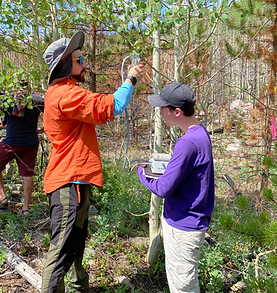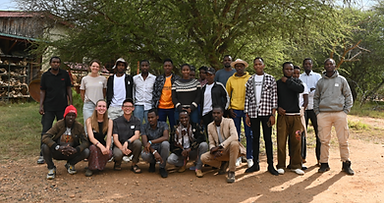Teaching Philosophy
The most fulfilling part about teaching is watching students get excited about patterns in nature while gaining confidence in their ability to conduct and discuss science. I strive to make my courses approachable and engaging by using a combination of hands-on activities, field experiences, and long-term datasets that connect ecological theory to real-world applications. My goal is to build student appreciation for nature, cultivate a sense-of-place within their local ecosystems, and demonstrate that research in the natural sciences is a viable and meaningful career path.
Teaching Experience
Savanna Ecology (BIOL495), Spring 2021 and 2023
I co-developed the Savanna Ecology course at Kansas State University. The course covered the biogeography of savanna systems, climatic determinants, soils and biogeochemistry, tree-grass coexistence, plant-herbivore interactions, and savanna conservation. We dedicated one class period a week to a student-led, hands-on activity to reinforce the topics covered in lecture. Activities included paper discussions, mini research projects, and lightning talks.
Savanna Ecology Field Course (BIOL495Z), May 2022
In 2022, I helped lead a 2-week field course in South Africa. The course combined lectures, field trips, and student-led research projects. Students spent the first week designing, conducting, and presenting group research projects at Wits Rural Facility. In the second week, we toured Kruger National Park and learned about research in the park, tree-grass interactions, trophic dynamics, and fire ecology from instructors with the Organization for Tropical Studies.


Plant Physiology Lab (BIOL501), Fall 2020 - 2022
I was a co-instructor for Plant Physiology Lab at Kansas State University. In this course, students gained hands-on experience working with plant physiological equipment, including pressure chambers, photosynthetic gas analyzers, osmometers, and spectrophotometers. A primary objective of this course was to increase data literacy through interpreting data. Students graphed and analyzed data collected in class each week. Assignments also included weekly figure interpretations from the published literature. At the end of the semester, students wrote independent research proposals to integrate the concepts and equipment covered in class with applied research questions.
Ecology Lab (BIOL632), Spring 2020 and 2021

In 2020, I was a co-instructor for Ecology lab and was the instructor of record in 2021.
The goal of this course was to provide students with hands-on experience conducting independent ecological research. Students developed their own research questions and hypotheses, and then designed and executed semester-long research projects. These projects involved data collection at local field sites and analysis of long-term data from the Konza Prairie Biological Station. Topics included assessing how fire frequency influences invertebrate communities, how habitat type affects ectoparasite loads on small mammals, how patch-burn grazing impacts bird communities, and more! To support students through the research process, we implemented "checkpoint" assignments and integrated R programming exercises throughout the semester. These tools helped break the projects into manageable stages and build coding skills. By the end of the semester, we were consistently impressed with the students' ambition and their ability to tell compelling scientific stories.
Additional Courses:
In addition to the courses described above, I was also a graduate teaching assistant for several courses during my MSc. In these courses, I lectured, hosted review sessions, and organized and led lab activities.
Taxonomy of Flowering Plants Lab (BIOL551), Fall 2018
Organismic Biology Lab (BIOL201), Fall 2019
Principles of Biology (BIOL198), Fall 2017 and Spring 2018
Computing Workshop

In 2025, I helped host a data management workshop at Mpala Research Centre (Laikipia, Kenya) alongside Sophia Ritcher and Evan Foster. This was an introduction to spreadsheets workshop for Kenyan students and field assistants from the surrounding communities. We covered formatting and organizing spreadsheets, data QA/QC, and designing data sheets for fieldwork. Topics were coupled with data cleaning and entry activities from Software Carpentries using ecological data.